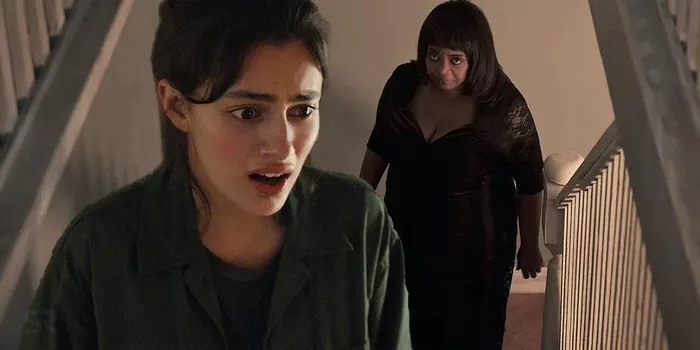Psychological horror and thriller movies often rely on the art of foreshadowing to draw viewers into a suspenseful narrative, and “Ma” is no exception. The genius of foreshadowing is in its subtlety; it’s like a trail of breadcrumbs that invites the audience to join the characters in solving a mystery. “Ma” opens with a group of teenagers, led by the fearless and charismatic Maggie, in search of an adult willing to purchase alcohol for them. When Sue Ann, an apparently unremarkable veterinary technician, offers her assistance, the stage is set for an intriguing but seemingly innocent interaction. The initial scene creates an atmosphere of dark comedy, and it’s this juxtaposition of humor with underlying unease that makes it a brilliant piece of foreshadowing. The audience doesn’t yet realize that this seemingly ordinary encounter is the lynchpin for a nightmarish descent into psychological horror.
Foreshadowing often relies on subtle cues and details that, in isolation, might not raise suspicions. In “Ma,” the seemingly mundane transaction of buying alcohol serves as a canvas on which the darker elements of Sue Ann’s character are sketched. As the teens interact with her, the audience begins to discern the first hints of an obsession that will ultimately become a central theme in the narrative. The foreshadowing is in the nuances of Sue Ann’s interactions, her choice of words, and the glimmers of infatuation that flash across her face. For viewers attentive to these details, the stage is set for a suspenseful journey, one that builds toward a shocking revelation. This is the essence of foreshadowing—a gradual unveiling that keeps the audience engaged in the unfolding story.
The Biggest Twist: Unmasking Factitious Disorder Imposed on Another
The central twist in “Ma” is unveiled as the story progresses, and it pertains to Sue Ann’s intricate psychological state. The seemingly mundane opening scene’s clever use of foreshadowing plays a pivotal role in revealing Sue Ann’s dark obsession and manipulation of the teenagers. This twist revolves around the concept of factitious disorder imposed on another (FDIA). It’s a rare yet harrowing mental condition in which a caregiver intentionally exaggerates, fabricates, or induces physical, psychological, or behavioral ailments in a person under their care. Sue Ann’s obsession with the teenagers and her escalating desire for their company leads her to manipulate, control, and even harm them in ways that shed light on the severe implications of FDIA.
The revelation about Sue Ann’s mental state, which is rooted in the foreshadowing of the opening scene, adds a profound layer to the movie’s psychological horror. It goes beyond the conventional jump-scares and gore, delving into the disturbing realm of psychological disorders. The opening scene’s seemingly innocent setup acts as the doorway to a narrative that not only thrills and terrifies but also forces viewers to confront the unsettling reality of mental health conditions. It serves as a chilling reminder that the darkest horrors can often be found within the human psyche, even beneath the façade of everyday normalcy.
Empowerment Amid Darkness
Despite its intense psychological horror, “Ma” ultimately carries a message of empowerment. The teenagers, initially unsuspecting prey in Sue Ann’s twisted game, gradually transform into formidable survivors. Their journey through manipulation, torment, and psychological abuse serves as a metaphor for the real-world experiences of individuals facing similar traumas. It’s a testament to their resilience and strength as they find the inner resources to confront their tormentor.
“Ma” masterfully demonstrates that empowerment can emerge even in the darkest of circumstances. The film underscores the importance of acknowledging the existence of real-world issues like abuse and manipulation, as well as the strength that can be found within individuals to overcome adversity. By the end, “Ma” becomes more than just a psychological horror film; it is a thought-provoking exploration of the human spirit’s capacity to triumph over terror and manipulation.
In conclusion, “Ma” is an excellent example of how foreshadowing can elevate the psychological horror and thriller genres. The opening scene’s apparent innocence and humor serve as the gateway to a suspenseful narrative that ultimately unveils a disturbing twist related to factitious disorder imposed on another. Yet, amid the darkness, the film also carries a message of empowerment, showcasing the resilience of survivors in the face of psychological abuse. “Ma” is a testament to the power of cinema to explore and dissect complex psychological issues while keeping audiences on the edge of their seats.

